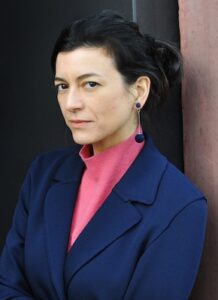Out
by Samanta Schweblin
“Darker and more tinged with terror than her breakthrough novel Fever Dream, this is Schweblin at her sharpest and most ferocious.” New York Times
Three flashes of lightning illuminate the night, and I catch a glimpse of dirty terraces and dividing walls. The rain hasn’t started yet. The sliding glass door of the balcony across from us opens, and a woman in pajamas comes outside to bring in the clothes from the line. I see all this as I’m sitting at the dining table across from my husband, after a long silence. His hands encircle the cup of tea, now cold, and his red eyes are still gazing at me resolutely. He’s waiting for me to be the one to say what must be said. And because I feel like he knows what it is I have to say, I can no longer say it. His blanket is balled up at the foot of the sofa, and the coffee table holds two empty mugs and an ashtray full of butts and used tissues. I have to say it, I tell myself, because it’s part of the punishment I now have coming. I adjust the towel wrapped around my wet hair and tighten the knot of my robe. I have to say it, I repeat to myself, but it’s an impossible command. And then something happens, something in my muscles that is difficult to explain. It happens step-by-step without my ever understanding exactly what it is: I simply push the chair back and stand up. I take two sideways steps away. I have to say something, I think, while my body takes two more steps and I lean against the china cabinet, my hands fumbling over the wood, holding myself up. I catch sight of the front door, and, since I know he is still looking at me, I take pains to avoid his eyes. I breathe, I concentrate. I take a step to the side, moving a little farther away. He says nothing, and I venture another step. My slippers are close by, and without letting go of the wooden cabinet, I reach out my feet to pull them toward me and put them on. My movements are slow, gradual. I let go of the cabinet, step a little farther away, as far as the rug, take a deep breath, and then, in only three long strides, I cross the living room, leave the apartment, and close the door behind me. My labored breathing echoes in the building’s darkened hallway. I stand for a moment with my ear pressed to the door, trying to hear sounds from inside – his chair when he stands up or his footsteps coming toward me – but everything is completely silent. I don’t have keys, I tell myself, and I’m not sure whether that worries me. I am naked under my robe. I’m aware of the problem, of the whole problem, but somehow my state, this extraordinary state of alertness, frees me from any kind of judgment. The fluorescent lights flicker on and the hallway turns slightly green. I go to the elevator and call it, and it comes immediately. The doors open and a man peers out without taking his hand from the buttons. He invites me in with a friendly gesture. When the doors close, I smell an intense lavender scent, as if they’ve just cleaned, and the light, warm now and very near our heads, relieves and comforts me.
“Do you know what time it is, miss?”
I’m comfortable in his company going down, but I don’t feel like listening. My arms hang loose and heavy at my sides, and I realize I’m relaxed, that leaving the apartment is doing me good.”
His deep voice confuses me, and it’s hard to tell if his words are a question or a reproach. He’s a very short man who only comes up to my shoulders, but he’s older than me. He seems like a janitor or a hired plumber or electrician, though I know both the building’s janitors and I’ve never seen this man before. He has almost no hair. His threadbare coveralls are open, and the clean, ironed shirt beneath makes him look crisp, or professional. He shakes his head, maybe to himself.
“My wife is going to kill me,” he says.
I don’t ask; I am not interested in knowing. I’m comfortable in his company going down, but I don’t feel like listening. My arms hang loose and heavy at my sides, and I realize I’m relaxed, that leaving the apartment is doing me good.
“I don’t even want to tell you,” says the man, and he shakes his head again.
“I appreciate it,” I say. I smile so he doesn’t take it the wrong way.
“I don’t even…”
We take our leave in the foyer with a nod.
“Best of luck to you,” he says.
“Thanks.”
The man walks off toward the parking garage and I go out the front door. It’s night, but I couldn’t say exactly what time. I walk to the corner to see how much movement there is on Avenida Corrientes, and everything looks asleep. At the stoplight I take the towel from my head and drape it over my arm, and I run my fingers back through my hair. The days this week have been humid and hot, but now a pleasant breeze wafts from Chacarita, fresh and perfumed, and I walk in that direction. I think about my sister, about what my sister does, and I wish I could tell someone about it. People are very interested in what my sister does, and on occasion I like to talk about things that interest people. Then something happens that in a way I am expecting. Maybe because a second before hearing the horn I’d already thought about him, about the man in the elevator, and so I’m not troubled by his car pulling up or by his smile, and I think, I can tell him about my sister.
“Can I give you a ride somewhere?”
“You could,” I say, “but the night is too nice to get into a car.”
He nods; my observation seems to change his plans somehow. He stops the car and I approach.
“I’m headed home because my wife is going to kill me, and for that to happen I need to be there.”

Avenida Corrientes, Buenos Aires. Luis Argerich/Wikimedia Commons via Flickr
I nod.
“It’s a joke,” he says.
“Yeah, of course,” I say, and smile.
He smiles, too, and I like his smile.
“But we could roll the windows down, all the windows, and drive the car nice and slow.”
“Do you think we’d bother anyone, going so slow?”
He looks both ways down the avenue. He has hair on the nape of his neck, a little reddish fuzz.
“No, there’s almost no one out. We could do it, no problem.”
“Okay,” I say.
I get in and settle into the passenger seat. He rolls down the windows and opens the sunroof. The car is old but comfortable, and it smells of lavender.
“Why is your wife going to kill you?” I ask, because before I tell someone about my sister, I ask them a question first.
He puts the car in first and concentrates for a moment on the clutch and the accelerator, moving the car slowly until it reaches a comfortable speed. He looks at me and I nod in approval.
“Today is our anniversary, and I was supposed to pick her up at eight so we could go out to eat. But there was a problem with the roof of the building. Did you hear?”
The air moves along my arms and over my neck, neither cold nor hot. Perfect, I think, this is all I needed.
“Are you a new maintenance man in the building?”
“Well, depends what you count as ‘new’… I’ve been at the building for six months now, miss.”
“And are you a roofer as well?”
“I’m an escapist, really.”
We’re driving very close to the sidewalk, almost on the heels of a woman who’s carrying an empty supermarket bag and walking quickly; she looks at us sideways.
“An escapist?”
“I fix fire escapes.”
“Are you sure that’s what an escapist does?”
“I can assure you it is.”
The woman on the sidewalk looks at us in annoyance and slows down so we have to pass her.
“Anyway, now it’s too late to go out to eat, and she must have spent hours waiting for me. Restaurants will all be closing by now.”
“Did you call her to let her know you’d be late?”
He shakes his head, aware of his mistake.
“You don’t want to give her a call?”
“No, I really don’t think it’s a good idea.”
“Well then, there’s not much you can do. You can’t make any decisions until you get there and see how she is.”
“That’s what I think, too.”
We look straight ahead. The night is still, and I’m not sleepy at all.
“I’m going to my sister’s house.”
“I thought your sister lived in the same building.”
“She works in the building, her studio is two floors above my place. But she lives somewhere else. Do you know her? Do you know what my sister does?”
“Excuse me, would you mind if I stop for a moment? I could really use a smoke.”
He stops the car in front of a kiosk, turns the engine off, and gets out. Everything is going great so far, I think to myself. I feel so good right now. There seems to be something special in all of this, but what it is escapes me. What sort of something? I wonder. I have to know what it is that’s working, so I can retain it and replicate it, so I’ll be able to return to this state when I need to.
“Miss!”
The escapist is waving at me from the kiosk. I toss the towel in the backseat and get out.
“Neither of us has change,” says the escapist, indicating the kiosk man.
They wait for me. I check the pocket of my robe for change.
“Are you okay?” asks the kiosk man.
Still focused as I am on my pockets, it takes me a moment to realize the question is directed at me.
“Your hair is wet,” he says, pointing at me in surprise, “like you just got out of the shower.” He looks at my robe, too, but says nothing about that. “Just say you’re okay and we’ll go back to the matter of change.”
“I’m okay,” I say, “but I don’t have any change either.”
The man nods, dubious, then crouches behind the counter. We hear him talking to himself, saying that somewhere in all these boxes there are always a few extra coins. The escapist looks at my hair. He is frowning, and for a moment I’m afraid something is breaking irreparably, some piece of this well-being.
“You know” – the kiosk man appears again – “I have a hair dryer in the back. If you want…”
I look at the escapist, alert to his reaction. I don’t want to, I don’t want to dry my hair, but nor do I want to refuse anything to anyone.
“We’re working on that,” says the escapist, pointing toward the car. “See? We’re driving with the windows down, in first gear, and it’s really hot. Soon her hair will be dry as a bone.”
The man looks at the car. He has some coins in his hand that he squeezes and jingles a couple of times before looking back at us and handing them to the escapist.
“Thanks,” I say as we leave.
My demeanor doesn’t seem to convince the kiosk man, and though he walks off toward the coolers, he still turns back a couple of times to look at us. Outside, the escapist offers me a cigarette, but I tell him I’ve quit smoking and I lean against the car, willing to wait. He lights one and exhales the smoke upward, the way my sister does. I think it’s a good sign, and that once we’re moving again we can get back whatever it was that we lost in the kiosk.
“Let’s buy something,” I tell him suddenly, “for your wife. Something she likes and that will prove to her you didn’t mean to be late.”
“Didn’t mean to?”
“Flowers, or something sweet. Look, there’s a service station over on the other corner. Shall we walk?”
This is no longer the right way, I think, and everything was going so well. The escapist laughs, sad. My body contracts, and I feel my hands and the back of my neck grow rigid.”
He nods and locks the car. The windows are still open, just as we had agreed when we started on this outing. That’s very good, I tell myself. And we walk toward the corner. Our first steps are sloppy. He walks close to the curb, with no rhythm, and he trips over his feet a few times, surprised by his own clumsiness. He can’t get in step, I think, I have to be patient. I stop looking so as not to make him uncomfortable. I look at the sky, the streetlight; I turn around to see how far we are from the car. I move a little closer, trying to recover a communication distance. I walk a little more slowly to see if that helps, but then he just gets farther ahead, until he stops. Annoyed, he turns toward me and waits. When we’re back together we coincide for a couple of steps, but soon we are out of sync once again. Then I’m the one who stops.
“It’s not working,” I say.
He takes a few more steps, circling me disconcertedly, looking at our feet.
“Let’s go back,” he says. “We can still keep going in the car.”
A subway train passes underground, the sidewalk shakes, and a wave of hot air rises from the grated openings. I shake my head. A few meters back, the kiosk man comes out and looks at us. This is no longer the right way, I think, and everything was going so well. The escapist laughs, sad. My body contracts, and I feel my hands and the back of my neck grow rigid.
“This is not a game,” I say.
“Come again?”
“This is very serious.”
He doesn’t move, and his smile disappears. He says: “I’m sorry, but I’m not sure I really understand what’s happening anymore.”
We lost it, I think, it’s gone. He stands looking at me, but his eyes have a shine to them; there’s a second when the escapist’s eyes look at me and seem to understand.
“Do you want to tell me about your sister?”
I shake my head.
“You want me to take you to the building?”
“It’s only eight blocks, I’d better walk it alone. You call your wife. I bet by now you do want to call her.” I pick some flowers, three flowers that extend out past the fence of a nearby building. “Here, give her these as soon as you get home.”
He accepts them without taking his eyes from me.
“Best of luck to you,” I say, remembering his words in the elevator, and I start to walk away.
I pass by the car and reach through the back window to pick up my towel. I cross to the other sidewalk, returning. I wait for a light, the towel draped over my arm the way a waiter would carry it. I look at my feet, my slippers, and I focus on their rhythm; I take in a lot of air and let it out meticulously, aware of its sound and intensity. This is my way of walking, I think. This is my building. This is the code for the front door. This is the button for the elevator that will take me to my floor. The doors close. When they open, the hallway lights flicker again. Outside my apartment I rewrap my hair in the towel. The door isn’t locked. I open it slowly, and everything, everything in the living room and the kitchen, is terrifyingly unchanged. The blanket is tossed at the foot of the sofa, the butts and the mugs are on the coffee table. The furniture, all the pieces of furniture are in their places, storing and supporting all the objects I can remember. And he is still at the table, waiting. He lifts his head from his crossed arms and looks at me. I went out for a while, I think. I know it was my turn to talk, but if he asks, that’s all I’m going to say.
from Seven Empty Houses (Oneworld, £12.99)
 Samanta Schweblin is the author of three story collections that have won numerous awards, including the prestigious Juan Rulfo Story Prize, and been translated into twenty languages. Originally from Buenos Aires, she lives in Berlin. Her debut novel Fever Dream was shortlisted for the Man Booker International Prize 2017. Seven Empty Houses, translated by Megan McDowell and a finalist for the National Book Award for Translated Literature, is published by Riverhead in the US and Oneworld in the UK.
Samanta Schweblin is the author of three story collections that have won numerous awards, including the prestigious Juan Rulfo Story Prize, and been translated into twenty languages. Originally from Buenos Aires, she lives in Berlin. Her debut novel Fever Dream was shortlisted for the Man Booker International Prize 2017. Seven Empty Houses, translated by Megan McDowell and a finalist for the National Book Award for Translated Literature, is published by Riverhead in the US and Oneworld in the UK.
Read more
@sschweblin
@OneworldNews
@riverheadbooks
Author portrait © Suhrkamp Verlag
Megan McDowell has translated books by contemporary South American and Spanish authors including Alejandro Zambra, Mariana Enriquez, Gonzalo Torné, Lina Meruane, Diego Zuñiga and Carlos Fonseca, and her translations have been published in The New Yorker, The Paris Review, The New York Times Magazine, Tin House, McSweeney’s and Granta, among others. In 2020 she won an Award in Literature from the American Academy of Arts and Letters. Originally from Richmond, Kentucky, she lives in Santiago, Chile.
meganmcdowelltranslation.com
@meganalimcd
Also on Bookanista:
Samanta Schweblin: Passion and terror
interview about Fever Dream
Butterflies
A micro story from Samanta’s Mouth Full of Birds


